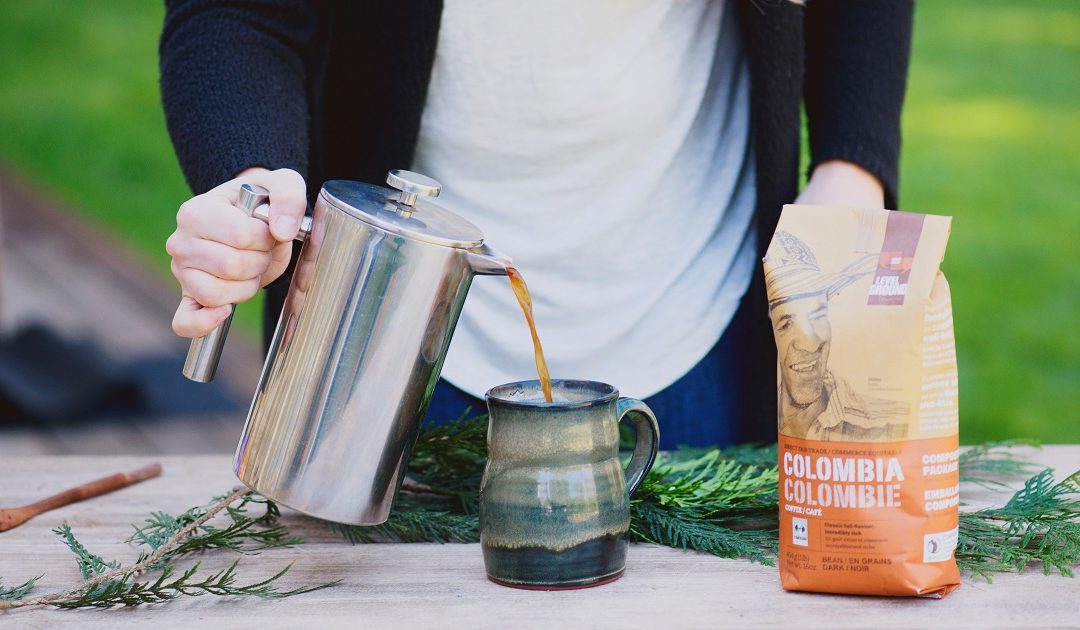By Carlos Chicas Berti. Originally published in the fall 2019 issue of Business Class magazine.
In 1997, when Level Ground Trading was started, few people thought about where their morning cup of coffee came from. This has shifted, and the Level Ground team is pleased to have played a part in the change.
In addition to introducing social responsibility to the morning cuppa, Level Ground has offered Victoria’s student population an alternative example of what it means to be in business.
Shaking the Hands that Farm the Land
Level Ground was built on the concept of fair trade.
“My business partner and I had this coalescing notion that all people, and particularly those who owned land and farmed it, should have adequate resources to survive and not live in poverty—but we saw that was often not the case,” says Stacey Toews, Level Ground co-founder and a regular speaker on Gustavson sustainability panels. “Our idea was to try and alleviate poverty among small-scale farmers, but by doing it through trade, not donations or non-profit work.”
In search of a product with a high demand that was produced by small-scale farmers, they found their first staple: coffee. Their experiment in fair trade quickly paid off, and the Victoria-based company expanded from buying the harvest of a few farmers to working with over 5,000 coffee farmers in more than nine countries throughout Africa, Latin America and Asia. Level Ground now boasts a team of over 30 people — more than one of whom are Gustavson graduates.
You Never Know Who’s Listening
As the company grew, Toews began speaking about sustainability and fair trade to groups throughout British Columbia and Canada. Among those listening was Robyn Barchen, BCom ’15, then a middle schooler.
“Level Ground has been a dream of mine ever since,” Barchen says. “I knew I wanted to work in business, but I always worried about how to do good, not just avoid doing harm. When Stacey spoke to my school about Level Ground it completely changed the way I looked at what I could do with my career.” Now a marketing lead with Level Ground, Barchen is one of the people behind the company’s famous packaging and marketing, which features the faces of some of the coffee farmers that grow Level Ground’s product throughout the world.
Bryce Byrnes, BCom ’19, recently completed a co-op work term at Level Ground. He was introduced to Level Ground’s ethos in a similar way. “I remember listening to Stacey talk during my core year and thinking that he was so passionate about the work he did. From then on I thought it would be great to work in an environment like that.”
Even for those who don’t end up employed there, the relationship between Gustavson students and Level Ground is a long and fruitful one.
“It’s a mutually beneficial relationship,” says Toews, who has volunteered many hours to Gustavson speaking engagements and mentorship over the years. “Students have a wealth of insight and energy, and that idealism that many of them have as young business students is essential to a growing business.”
Angela Yu, BCom ’18, now in charge of retail sales and fundraising for Level Ground, recalls that “Level Ground was often an example in our sustainability courses and that’s how I first learned about them. So when I saw a job posting with the company, I was instantly interested.”
Building Connections
Level Ground does regular trips to its partner farms to connect employees and farmers. On Barchen’s recent trip to Colombia, she got to meet Jaime—the farmer whose image appears on the packaging for Level Ground’s Colombia coffee.
“The trip gave me the chance to form a real relationship and see the actual people and work behind the products we made,” she says. “Knowing the farmers is about more than just the quality of the food, it’s also about respecting them as partners, interacting with them and seeing how proud they are of their products.”
When Toews first started the company, the idea of fair trade was still new. “A lot of sustainability concepts and notions simply didn’t exist,” he says. Level Ground was a pioneer
in the new sustainable and socially responsible industry that would emerge. Yet its ultimate goal was always the same: “We wanted to create a business structure or chain of supply that supported farmers, knowing that if people are socially sustained and have their primary needs met, they have the potential to be more intentional with their choices, and so they can be more sustainable and help their communities in deeper ways.”
One possibly unintended consequence: the company’s example has helped inspire a generation of students in Victoria to expect more, both from the brands they consume and the careers they build.
Photo: Courtesy of Level Ground Trading


